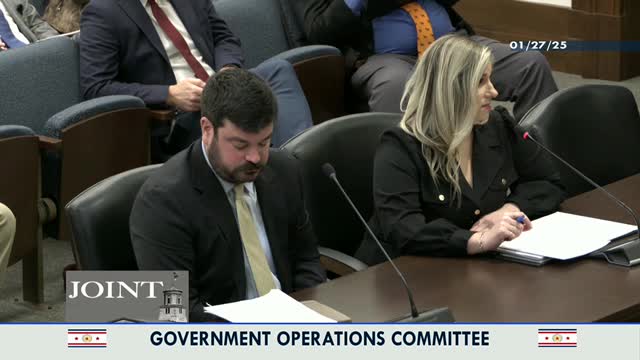GovOps reviews licensing boards’ reserves; many boards cite personnel and tech costs, several plan fee changes
Get AI-powered insights, summaries, and transcripts
Subscribe
Summary
State licensing boards told the Jan. 27 Government Operations committee that personnel pay adjustments, technological costs and legal expenses explain recent shortfalls for many health‑related boards; some boards have approved fee increases, others fee reductions or further review.
State licensing boards and the Department of Health told the joint Government Operations Committee on Jan. 27 that personnel costs, pay market adjustments and various technology and legal expenses largely explain recent revenue shortfalls for several health‑related licensing programs.
The department briefed the committee in a series of statutorily required self‑sufficiency hearings. Jennifer Putnam, assistant commissioner for health licensure and regulation, presented fiscal summaries for multiple boards and committees, explaining why some boards fell short in fiscal years 2023–24 and how they plan to align reserves with the division’s guideline that boards generally hold between one and 2.5 times typical operating expenditures.
Among specific details presented in committee: - Acupuncture advisory committee: expenditures exceeded revenues by $594 (FY2023) and $9,784 (FY2024); the committee reported a reserve balance of $252,252 (an overage relative to the division guideline) and approved a fee decrease at its Feb. 24 meeting to reduce the overage. Alexa Hulsey (vice chair) and Putnam said refunds were discussed but not pursued; committee legal counsel Doug Garrett said he would research statutory limits on refunds. - Alcohol and drug abuse counselors board: deficits of $12,842 (FY2023) and $10,378 (FY2024); reserve $121,512 (below guideline by $78,094); the board approved a fee increase in April 2024. - Dentistry board: large deficits reported (FY2023 and FY2024) with a reserve of $2,395,733; the board approved fee changes in 2023 and October 2024 to address the trend and identified contested case and other costs as drivers. - Dispensing opticians: slight deficits in both years with reserve $773,488; the board planned fee‑reduction discussions for April 2025. - Nursing: deficits of $1.38 million (FY2023) and $1.16 million (FY2024) but a reserve of $5,982,400 that falls below the guideline by $11,321,070; board to discuss fee increases at Feb. 2025 meeting. The board emphasized high volume (roughly 169,000 licensees) as a structural reason for large operating figures.
Department representatives repeatedly cited common causes: market pay adjustments included in the 2022 budget, performance pay increases for state employees, a reduction in licensee counts in some programs, and the assignment of centralized technological charges (for state systems) across boards by licensee percentage.
Committee members asked for more granular information in some areas: Representative Hardaway pressed the department to investigate whether refunds are legally possible where fees produced an overage, and requested the departmental formula used to set reserve targets. Several lawmakers — including Representative Sam McKenzie and Representative Paul Parkinson — asked about licensing timelines for nurses and the benefit of compact arrangements; staff said the nursing compact is in use and that delays most commonly arise from incomplete application materials or third‑party documents required before applicants can sit for national exams.
Several boards reported actions taken or planned to address reserves: fee increases (alcohol & drug counseling, nursing home administrators, occupational therapy, physical therapy, podiatry, polysonography, physical therapists) or fee decreases (acupuncture, optometry, professional counselors, respiratory care). Most boards cited contested‑case hearings, legal and investigative costs, or staffing/technology increases as the primary drivers. Where boards approved fee decreases, the department said the approved rules still needed to complete the rule review process before taking effect.
No substantive public comments were offered at the hearings for the listed boards. Committee counsel Doug Garrett reminded members the committee can recommend fee changes or other actions when statutes and public hearings require them.
Committee members asked the department to provide: (1) the reserve‑target formula and per‑board calculations; (2) comparative benchmarking versus neighboring states for efficiency and fees; and (3) a lookup on whether refunds can be issued to licensees who paid into overages. Department staff agreed to supply those follow‑ups to the committee.
